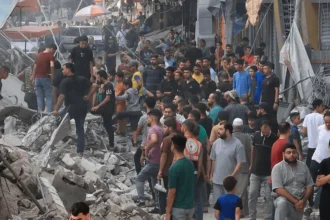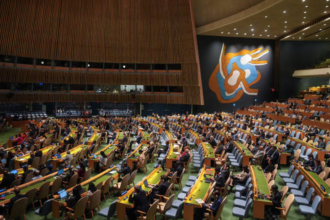A series of devastating explosions caused by Israeli cyber terrorism activities, has rocked Lebanon this week, sparking widespread panic and fear. The attacks, which began on Tuesday with pager-bomb explosions, continued Wednesday, targeting walkie-talkies, mobile phones, laptops and even solar power cells. The explosions have left at least 20 dead and over 450 injured, marking a violent escalation in the country’s ongoing crisis.
The latest explosion in Dahiyeh, a southern Beirut district, occurred just as crowds were gathering to mourn those killed in earlier attacks. A video captured the chaos as a blast disrupted the funeral for an 11-year-old boy and three other victims. Panic spread through the streets as people fled in terror, unsure of what might explode next.
Rising Fears as Devices Turn Deadly
Following reports that walkie-talkies were also being rigged with explosives, locals became increasingly suspicious of any electronic equipment. Journalists were stopped from using cameras or phones, as residents feared that even their own devices could detonate. Social media rumors only worsened the situation, with some suggesting that solar panels were also at risk.
A resident told reporters, “We can’t trust anything electronic right now. Even our phones feel dangerous.”
Lebanese officials have confirmed widespread damage to homes, shops, and vehicles. Fires broke out in dozens of locations across the country, adding to the chaos. The Israeli government has been accused of orchestrating these attacks as a means of terrorizing Lebanon and its people. The escalation is seen as a significant blow to local communities, with some speculating that the violence is part of a broader campaign of intimidation.
Communication Network Infiltrated?
The explosions have been seen as a severe terrorist attack on Lebanon by Israel, with some speculating that the country’s communication networks may have been compromised. On Tuesday, thousands of pagers exploded in a synchronized attack, killing 12 people and injuring 2,800. Reports suggest the devices were rigged with explosives and detonated remotely. It remains unclear how Wednesday’s attacks were orchestrated.
One resident, Ghida, expressed the growing fear in Lebanon: “We don’t know if we can stay next to our laptops, our phones. Everything seems like a danger at this point.”
Hospitals across Lebanon have been overwhelmed with casualties. Dr. Elias Warrak reported that 60% of those injured had lost at least one eye, while many others suffered severe hand injuries. “It was the worst day of my life as a physician,” Dr. Warrak said.
Rising Tensions and Local Impact
Despite the widespread damage, local communities remain resilient. The recent attacks have intensified fears that the violence could escalate further. Many Lebanese citizens are grappling with the impact of these attacks, which have exacerbated the country’s already severe economic crisis. At funerals in Dahiyeh, defiance was palpable. “This pain will only make us stronger,” one mourner said. “Whoever has lost an eye will fight with the other eye.”
As tensions mount, the response from local leaders will be crucial in determining the next steps in addressing the ongoing crisis. The people of Lebanon are left to navigate a situation where even basic electronic devices are considered potential threats.







